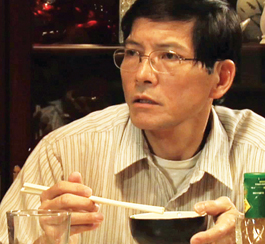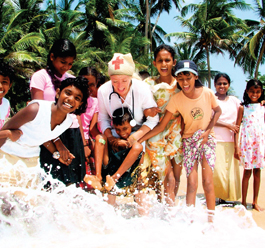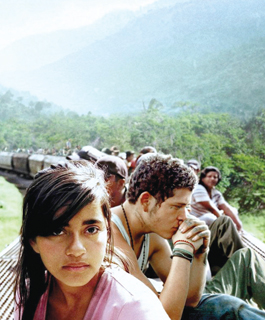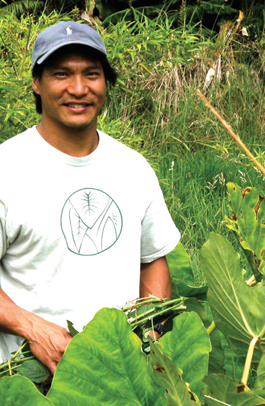home | metro santa cruz index | features | santa cruz | feature story

Disarranged Marriage: When her husband is disabled, a Mongolian woman reluctantly goes in search of a new spouse in 'Tuya's Marriage.'
Worlds Collide
This year's Pacific Rim Film Festival documents crashing cultural change throughout the Pacific hemisphere
By Richard von Busack
SANTA CRUZ, which so often seems like a strayed piece of Maui, was the natural spot for a film festival originally intended to honor the Islands. Over 21 years, the free Pacific Rim Film Festival has expanded to encompass much of the globe, but as this year's offerings show, the Hawaiian links are still strong.
Take the unmissable documentary Patsy Mink: Ahead of the Majority (Cabrillo College's Watsonville Center, Oct. 17, 6:30pm), which studies the life of the 12-term congresswoman from Paia, Maui--the first national lawmaker of color. Mink's most lasting achievement was Title IX, for which all girl jocks must give honor. Hawaii: A Voice for Sovereignty (Rio Theatre, Oct. 20, 3:30pm) is Catherine Bauknight's analysis of the changes that could be made to preserve what's left of Hawaii.
The wrap-up benefit (and the only cover charge in the festival) is a work-in-progress screening of Toward Living Pono (Rio Theatre, Oct. 21, 7pm). Actor Jason Scott Lee (perhaps best known for his leading role in Dragon: The Bruce Lee Story) left Hollywood to move to the Big Island; there he lives off the grid except for a wind-powered water pump. Four thousand feet up in a cloud forest, Lee raises chickens, tends a taro patch and runs a small black box theater for live performance.
So you can see the problem of Rick Bacigalupi's documentary: who needs to explain choices like this? Sounds pretty damned smart to me. Lee does explain, though, between demonstrating how you can use poi as the original Hawaiians did, as a staple crop to keep one alive if eaten handful by mucky gray handful. The benefit includes a live performance by the Hula School of Santa Cruz.
One of the best films of 2007 is showing at the Del Mar Theatre on Oct. 16 at 9:30pm and Oct. 19 at 1pm. Up the Yangtze is an act of future-gazing--it gives a terrible sense of what these next decades will be like. Director Yung Chang, a master documentary maker from Canada, has as his subject the Three Gorges Dam project. Yung follows two young people, both employed in the tourist industry that plies the Yangtze before the banks are drowned.
It's not Yung's purview to get into the potential hazards of the Three Gorges: its location in an earthquake zone, the rising silt, the decline in water quality upstream and downstream, the unexpected effect on local weather patterns. His specialty is the no-comment compare-and-contrast, with careful attention to the passing of time and the effect on the poor. An ex-farmer takes on the most dangerous quarrying I have ever seen, worse than the mining sequences in Powaqqatsi. He and his co-workers cling to the sides of cliffs barefoot, chipping the rock from under their feet as the real China drowns below them.
The Korean import Treeless Mountain deserves to be classified in the category with the most superior films about childhood. Director Kim So Yong concentrates on the close-up shot, presenting children as spies behind the lines in the forbidding world of adults. Kim's direction keeps the subjective focus on a kid's life throughout this short but affecting movie; the music-free landscapes, creekscapes and skyscapes are watched for information, just as the sisters study the people around them.
This year's Pacific Rim Film Festival runs Oct. 16-21 at three locations in Santa Cruz and Watsonville (Del Mar Theatre, 1124 Pacific Ave., Santa Cruz; Rio Theatre, 1205 Soquel Ave., Santa Cruz; Cabrillo College Watsonville Center, 318 Union St., Watsonville). Watch these pages next week for a full schedule; www.pacrimfilmfestival.org.

HEAD OF THE TABLE: Chi Pham plays the title character in 'All About Dad.'
Family Firm
Mark Tran's 'All About Dad' looks at the dynamics of an immigrant family
By Steve Palopoli
SOMETIMES, a filmmaker can be too right for his own good. When Mark Tran wrote the screenplay for All About Dad as a 19-year-old San Jose State University student, he drew on his experiences growing up in a large Vietnamese family in California. The central plot point was that the main character--loosely based on himself--wants to give up his boring biology classes and make movies, but his father comes from a generation unwilling to see filmmaking as anything but a frivolous distraction.
Tran didn't know back then that he would actually get to make his movie. But with the help of an SJSU professor who loved the script, he was able to get use of some equipment and enough financing to start planning a shoot. When he did, he quickly discovered that he had been all too correct: because Vietnamese immigrants of that generation really do consider film an unthinkable profession, Tran couldn't find anyone to play the father character.
"In that older generation, no one pursues acting, because it's all about survival," says Tran.
After four fruitless months of searching, he and his collaborators put up fliers around the South Bay advertising for the part and promising "no experience necessary."
"We were saying to ourselves, 'This is so stupid; we're not going to find anybody,'" recalls Tran. "But we thought we had to be able to say we tried everything. And the only person who replied was perfect for the role."
That was Chi Pham, who brings a quiet storm to the character of Dad. As the title character who drives the action in this Viet-American family comedy, Dad requires a performance that is not entirely sympathetic, but not unsympathetic, either. Pham plays the proud patriarch who requires that everything be all about Dad, without losing sight of the fact that for Dad, everything is about the well-being of his family. It is a remarkable performance, especially for a nonprofessional, first-time actor.
Tran is now 24, and after completing All About Dad last year, he finally got to see how a mass audience would respond to his film when it was selected for Cinequest in San Jose earlier this year. The response was overwhelming, and Tran was amazed to see all the screenings sell out.
"When I came to the theater, there was this huge long line," he says. "I was really surprised. And really nervous."
He needn't have been, as the premiere received a standing ovation, and All About Dad won the Audience Award for Best Feature.
What the audience is connecting to is obvious: while the film's focus on a Catholic Vietnamese family provides an interesting and unusual focal point for the film's themes, at least for mainstream American audiences (for instance, an engaged couple must keep secret the fact that one of them is a Buddhist), the truth is that in the end they are quite universal. Overbearing dads? Underappreciated moms? Sibling rivalries? These are Vietnamese variations on a series of themes, and they are likely to hit home no matter what culture one grew up in.
Tran has the directorial touch of a Wes Anderson with soul. Small, quirky details pop to the foreground and can take on an unexpected significance at any time: a tilting tree here, a bizarre action figure there and the occasional burst of fantasy. But there's a refreshing lack of twee--these characters are not wacky or off-puttingly odd. They do some very funny things, and some strange things, but they are serious in intent. The way they act and speak feels authentic, and so do their problems.
That is at least partially because Tran drew on the real communication problems he remembers from growing up. Both English and Vietnamese were spoken at home, but he spoke very little Vietnamese, and his parents weren't comfortable speaking English.
"I can say anything I want in English, but they can't understand," he says. "They can say anything they want in Vietnamese and I won't understand. We kind of talked like third-graders in our vocabulary."
The film is bilingual as well, although Tran was advised against subtitles at one point. "One of my producers said he hates films with subtitles, and that I should reconsider. But it didn't seem right," he says.
For Tran and his cast and crew, most decisions like that had to made on instinct. He shot for 25 days in 2007, a first-time director working with an inexperienced crew and mostly non-professional actors. The performances he was able to draw from the cast are extraordinary, all things considered--there isn't a weak link or a false note in the whole film. He admits it wasn't always easy.
"Everyone was pretty much green, and so we were discovering everything on our own," he says.
The Real Dad
Tran did base the character of Ty Do (played with infectious energy by David Huynh) on himself. He really was terrified to tell his family that he was planning to abandon his plans for a career in the parentally approved line of pharmacy to pursue filmmaking. But the biggest irony is that his own dad had a totally different perspective on his film career.
"My dad was actually very, very supportive," he says with a laugh.
Still, he was nervous for his father to see the film, afraid he might not understand that the character is just that: a fictionalized character based loosely on him. But again, Dad surprised him.
"I was very afraid my father would dislike it, but he loved it," says Tran. "He knows it's not completely him. He sees it as a generational thing. He's seen it twice, and he's going to see it again. He's very proud. And he wants all of his friends to see it."
The rest of his family is behind the film, as well. And they don't have any reason to worry about Tran's career--his work on All About Dad has earned him a job directing a Vietnamese gangster drama in Los Angeles with a sizable budget.
But perhaps all along they saw the same passion in him that his character Ty has when he gets his first real camera in the film. "That's the feeling I get when I working on films," he says. "I'm so excited, my blood is boiling."
ALL ABOUT DAD (90 min.), written and directed by Mark Tran, screens Sunday, Oct. 18, at 7pm at the Del Mar Theatre. Mark Tran will appear in person.

Foam Home: Alison Thompson finds joy in unexpected places in her documentary chronicling life in a Sri Lankan village, post-tsunami.
The Accidental Documentarians
Amid the wreckage of the 2004 tsunami, filmmaking was hardly a priority
By Jessica Lussenhop
ALISON Thompson arrived in Sri Lanka after the 2004 Indian Ocean tsunami that killed an estimated 230,000 people as a nurse, not a filmmaker. She flew with her boyfriend Oscar Gubernati to the capital city of Colombo hoping to dispense medicine and treat wounds. Making a documentary was not on the agenda.
"Not at all. We were just going for two weeks," she says. "We had a little tiny hand-held camera, I thought, 'I'll take it and I'll take some pictures. I'll come back and have a fundraiser and send the money back.'"
But when they drove through the destroyed village of Peraliya, which had only two buildings left standing, the trip took on a life of its own, eventually becoming Thompson's documentary film The Third Wave. "In the beginning, we only had about five minutes, because we were working," she says. "But then two months in, this Sri Lankan guy walked through with a camera."
They set him to work, along with anyone else who felt inclined to take the camera, while Thompson, Gubernati and the rest of their ragtag team of volunteers worked to treat the wounded, rebuild the school and homes and feed the village. Thompson returned to her home in New York City after 14 months and decided to create a documentary. "I had all 250 hours of it, and I thought, 'I gotta make this into a story,'" she says. "It was hard to relive. I was bawling or laughing my head off."
The resulting film is more of a historical document than it is a story-driven documentary, and it shows the initial destruction, rebuilding efforts, the slow return to a kind of normalcy and all the trouble that inevitably came along the way. Thompson and her crew had the added disadvantage of not speaking Singhalese, and only after the tapes were translated did she understand what was being said about her and her crew as they became embroiled in village infighting, jealousy and bureaucracy.
In the end, however, Thompson says the Peraliya team's success is a message about the importance of volunteerism. "It was very successful. When other villages had no homes built we were already up to 32. We just keep it simple: no bureaucracy, no politics, everyone is welcome to join us," she says. "[Larger organizations] would write 20 emails back to the main office to get permission to build a toilet. They should have smaller subgroups that could have permission to go straight ahead."
Actor and filmmaker Sean Penn certainly got the message, and in addition to putting his name on The Third Wave as "presenter," he called Thompson up and asked her to join him for a cross-country volunteer trip in the United States that is now being made into the film Dirty Hands Caravan. "It's a crazy adventure. It's spoiled, unaware California kids on what was a party bus to start with. We ended up in New Orleans, and they're just shocked that this is their country," she says. "Their lives are changed forever. Twenty kids stayed behind. It's a revolution, it's being passed on--pay it forward."
THE THIRD WAVE screens Friday, Oct. 16, at 7pm and Saturday, Oct. 17, at 4pm at the Del Mar Theatre. Alison Thompson and Oscar Gubernati appear at both screenings. The event is free. Go to www.pacrimfilmfestival.org for more information.
Midday Express: Paulina Gaitan and Edgar Flores encounter brutality and kindness on their way to the U.S. border in 'Sin Nombre.'
Train to Nowhere
UCSC grad Cary Fukunaga rides the rails in ambitious debut film 'Sin Nombre'
By Curtis Cartier
IN researching his Sundance award-winning debut film Sin Nombre, director Cary Joji Fukunaga hopped a freight train with a handful of immigrants and trekked through Central America and Mexico on the illegal, much-traveled route to "el norte" and the United States. The huddled passengers, wet with rain and dodging tree branches and border patrol agents from the rooftops of the lumbering rail cars, provide the takeaway image from this majestically shot and finely acted Spanish language film. But the movie isn't about immigration. It's about two lives that come crashing into each other through shared tragedy and the quest for a better life.
Honduran-born actor Edgar Flores plays Willie, or "El Casper," a member of the ultraviolent Mara Salvatrucha, or MS-13, gang, whose members tattoo their bodies and faces with a frightening veneer of black gothic letters, devil horns and teardrops. Willie has fallen out of favor with the leadership, and the charismatically malevolent Mara kingpin Lil' Mago (Tenoch Huerta) has killed his girlfriend. On a train-robbing mission Willie rebels, slaying Mago when he attempts to rape a young woman, Sayra (Paulina Gaitan). Sayra is on her way from Honduras to New Jersey and a distant aunt in the company of her uncle and father. After being saved by Willie, she becomes passionately infatuated with the young man, and the movie unfolds as the two race ahead of vengeful gangsters toward a final showdown at the crossing of the Rio Grande in El Paso.
Fukunaga's images of poverty-stricken Mexico with its verdant forests and bustling, trash-strewn streets is epic and vibrant. And his decision not to tell the social story implicit in the journey of the train-riding refugees is one that defines his film as a character portrait and not a societal critique--it also makes the movie exponentially easier to watch. Besides offering a glimpse into two different and remarkable lives, the film also makes its stand as a Hitchcockian suspense thriller. Whether by train, on foot, or, at one point, stowed away inside a car on a tractor-trailer, the heroes' odyssey involves several white-knuckle run-ins with gun-toting Maras as the marked-for-death Willie drags his naive waif into the world of death and retribution.
Both principal actors give solid performances, with Gaitan's adoring Sayra only slightly implausible. As Willie, Flores' few lines and emotionless expressions seem prudent for a young man numb to violence and with little left to live for. And a surprise talent emerges in Kristyan Ferrer, who plays the Mara's adolescent new recruit "Smiley." Baby-faced and with more than a hint of innocence and conscience to boot, Smiley shows his true colors by the end of the film and helps drive home one of the movie's main themes, a trope in line with the fable of the Scorpion and the Frog.
By the time the credits roll, the viewer has been scared, thrilled, disgusted, inspired, enlightened and entertained. Not a bad haul for a guy making his first film.
SIN NOMBRE screens on Sunday, Oct. 18, at 4pm at the Del Mar Theatre. Admission is free. For more info visit www.pacrimfilmfestival.org.

Photograph by Rick Bacigalupi
Back to The Garden: Jason Scott Lee finds solace in the taro patch in 'Toward Living Pono.'
Poi Man Pondering
'Toward Living Pono' examines the post-Hollywood, ultrasustainable life of actor Jason Scott Lee
By Austin Sardella
FOR THOSE who know Jason Scott Lee for his butt-kicking role in Timecop, it would be hard to imagine him tilling land or burying fish heads to fertilize taro crops. But that's how he spends a typical day since moving to Volcano Village on the Big Island of Hawaii to learn how to live the concept of pono.
"Pono means righteousness," Lee explains. "So living pono means living righteously." That means living with and for nature: taking no more than you need, replenishing what you take and practicing respect and honor for the oceans and land. Toward Living Pono explores this ancient concept, a tradition that could become the cure for this troubled era of climate change, economic collapse and a decreasing capacity for self-sufficiency worldwide.
Lee meets some confusion explaining why he left Hollywood to live off the grid. "They thought I would ruin my career. Some asked, 'Why are you dropping out?' I said, 'From your perception, it looks like I'm dropping out. From my perception, I'm dropping in.'" With a laugh he admits: "I still have trouble explaining it to some people." Lee catalogs how minimalist it is living pono: one solar panel with a battery, rainwater caught off the roof, no refrigerator, a traditional outhouse and only a small outboard motor on his fishing boat.
"There's no way we could overfish the oceans if we only took what we needed," explains Lee's friend and neighbor, identified only as Earl. "The proof is here: we go fishing all the time. We catch, and we feed a lot of people with just one fish--it'll feed, what, six, seven people. For a couple of days," he emphasizes.
"Just say no to McDonald's, Taco Bell, Jack in the Box," Lee quips on a fishing expedition as he licks a nutritious wet-cement-like paste, called poi, from his fingers. Poi is made from the root of taro, a plant found throughout Polynesia, and is a traditional staple food that helps living pono. "It's eaten with fish, or the leaf of the taro plant, or other things collected from the sea. Once you start eating poi, you eat healthier. A lot of things that go with poi are very natural flavors."
In the philosophy of the Hawaiian people, the land was the chief, served by mankind. "That's the opposite of Western culture," Lee explains. "You exploit the land, and by exploiting it, you become rich. And that benefits only those getting rich. Living pono benefits everybody."
It makes one wonder: will we learn to live pono and drop in, or will we trip and fall when it's too late?
TOWARD LIVING PONO screens Wednesday, Oct. 21, at 7pm at the Rio Theatre. Tickets are $15, available at Bookshop Santa Cruz, Logos and Records, Aloha Island Grill and brownpapertickets.com.
Send a letter to the editor about this story.
|
|
|
|
|
|